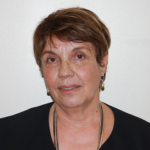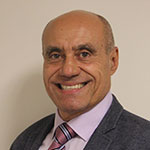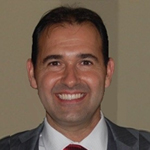The Ph.D. in Human Services program at Albizu University, Miami campus, prepares students to become culturally competent and socially responsible professionals who excel as advocates, scholars, and leaders serving and empowering marginalized and underserved populations.
DOCTOR OF PHILOSOPHY IN HUMAN SERVICES
PROGRAM OVERVIEW
It takes a committed and caring individual to help people who are struggling with physical or mental illness, addiction, or the repercussions of poverty or crime. Doctoral studies in human services give you the necessary knowledge, skills, and abilities to empower individuals in need, contributing to their well-being and enabling them to live constructive, rewarding, and autonomous lives.
Students enter the program with master’s degrees in disciplines that include mental health, psychology, education, social work, sociology, speech and language pathology, pastoral counseling, anthropology, nursing, public health, and criminal justice, among others. In each of these fields, public and private institutions provide assistance to individuals at every stage of life who are physically or emotionally challenged due to age, poverty, abuse, disability, immigrant or minority status, illness, addiction, imprisonment, or violence.
Whether your interests lie in administration, professional practice, or academic research, Albizu University offers the training you need to become a culturally sensitive leader of change. Now is the time to transform your life and the lives of others.

The PhD in Human Services offers to doctoral students who demonstrate excellence, membership at the Beta Beta Alpha Chapter, part of the Tau Upsilon Alpha (TUA) National Organization for Human Services Honor Society. The mission of TUA is to honor academic excellence; to foster lifelong learning, leadership and development; and to promote excellence in service to humanity.
Member benefits of the Beta Beta Alpha Chapter include a:
Membership Benefits
- Membership Pin and Certificate
- Graduation Regalia
- Scholarship Opportunities
- Experiences gained through local chapter activities are great for resume/vitae building
- Recognition as a member of an academic and professional honor society
- Lifetime Membership



ACCREDITATION
Albizu University, founded in 1966 and established in Miami in 1980, is the first Hispanic Institution specializing in Graduate Study in Psychology in Puerto Rico, United States, and The Caribbean. Accredited by the Middle States Commission on Higher Education (MSCHE), and licensed by the Commission for Independent Education of the Florida Department of Education (CIE). The Doctoral Program in Clinical Psychology (Psy.D.) is accredited by the American Psychological Association (APA). The Master in Science in Speech and Language Pathology is accredited by the American Speech-Language-Hearing Association (ASHA). © Albizu University 2015.
PROGRAM HIGHLIGHTS
As a student in the Ph.D. in Human Services program, you will acquire scholarly knowledge based on state-of-the-art research findings, a solid grounding in ethics, and the ability to influence policies and laws governing the field of human services. We offer all our courses in hybrid format, and all of our classrooms are equipped for virtual learning, which provides a flexible option for our students. (Please note that, according to U.S. immigration regulations, F-1 international students may take only one online or hybrid class per term. J-1 students are not allowed to take any online or hybrid courses.)
The program prepares you to take a leadership role in serving individuals in need, their families, and their communities by building your proficiency in the following areas:
- Mediating conflicting situations, handling crises and attending human resources matters
- Developing or expanding research programs, seeking and obtaining funding, and analyzing and interpreting policies, rules, regulations, and laws
- Understanding the administrative roles and processes of nonprofit organizations
- Negotiating contracts and agreements with for-profit and nonprofit organizations and federal agencies
- Leading others in the human services field, enabling them to achieve collective goals through effective planning, integration, and organization
The general curriculum prepares culturally sensitive human services professionals who are proficient as organizational leaders, academicians, researchers, and advocates. In addition, two specializations are offered:
- The Conflict Resolution specialization provides the additional skills and strategies needed to become an effective local and international negotiator, peacemaker, and agent of change.
- The Gerontology specialization highlights successful aging as well as specific strategies and services to help older adults better cope with biological, personality, social, and cognitive changes.
- The Children and Families specialization focuses on the role of advocacy in addressing pressing issues faced by youth at risk and their families, as well as on skills and abilities that enhance protective efforts
- The Neurolearning Specialization reviews the neuroscience foundations of learning, cognition and emotion in both the normal and pathological brain, offering an effective approach to identify and treat neurodevelopmental variations.
CAREER OPPORTUNITIES
Graduates of the Ph.D. in Human Services program serve in prominent positions in public or private service agencies. Your doctoral-level work, knowledge of cultural and ethnic issues, and original, outcome-oriented research will prepare you to occupy a leadership role in administration, professional practice, research, or academia, where you will collaborate with a network of experienced human services faculty and professionals to improve local and global communities.
ADMISSION REQUIREMENTS
The application for the Ph.D. in Human Services program consists of the following:
- A completed and signed application form submitted prior to the established deadline and accompanied by the $50 application fee. Begin the application process by setting up an online account.
- Official transcripts from all previous undergraduate and graduate (if applicable) institutions attended, showing that the following conditions have been met:
- The program requires a master’s degree in mental health, education, social work, sociology, speech and language pathology, pastoral counseling, anthropology, nursing, public health, criminal justice, or another human services-related field.
- A graduate GPA of 3.0 or higher is required.
- The transcripts should include any degree received. A bachelor’s degree from an accredited institution of higher education in the United States is required. Applicants enrolled in an institution of higher education outside the United States whose standards of training are substantially equivalent to the standards of training of those institutions in the United States will also be considered.
- Three letters of recommendation—at least two of which should be from current or past professors and one of which may be from a supervisor—submitted either as letters evaluating the applicant’s academic performance, clinical or field experience, and research experience or on the Albizu University recommendation form.
- A current curriculum vitae summarizing the applicant’s credentials.
- A Statement of Purpose, which should be double-spaced, typed, and two to three pages in length, articulating career goals.
- Proof of appropriate immigration status for all international students. International students should also submit an official evaluation of academic credentials by an authorized agency. The credentials must include the GPA. For detailed information on this requirement, please refer to the Credential Evaluation Services page of the Albizu website. All admission credentials for international students must be received by Albizu University at least 90 days prior to the beginning of the session of expected enrollment.
Founded in 1966, Albizu University is the first professional school of psychology established in North America and the Caribbean, with an ongoing focus on serving culturally diverse populations.

Expert Faculty
Our courses are taught by professors who are both academics and active professionals. Faculty members bring to the classroom a working expertise in theories, research, and practice in their fields.

A Strong Heritage
Founded in 1966 Albizu University is the first professional school of psychology established in North America and the Caribbean.

Flexibility
Albizu University offers morning, afternoon, evening, and night classes to provide you with the flexibility and convenience you need to meet all of life’s demands. Online classes and programs are also available.
FACULTY TESTIMONIALS

Albizu’s human services program follows the educational philosophy of all Albizu’s programs and services in its “commitment to social justice and a culture of peace” Albizu’s philosophy of care is embedded in the Ph.D. in human services curriculum, with its emphasis on ethics, crisis intervention, and conflict management. As future culturally sensitive researchers, leaders, and administrators in the human services field, Albizu’s students are well positioned to maintain life-long learning, fostering human care and knowledge in a variety of contexts.
– Dr. Irene M. Bravo
Professor and Director, Ph.D. in Human Services Program

“As a clinical psychologist, I provide a human angle to the teaching of statistics and test construction. My goal is for students to learn these subjects in an anxiety-free environment. I always assess the level of my students a priori, so my teaching style accommodates to their current level. Using that approach helps me to build upon their knowledge to reach the competencies students must master. I use a hands-on approach aided by specialized statistical software as a tool to analyze data. My students learn to use SPSS, AMOS, Comprehensive Meta-Analysis (CMA), and EXCEL/Statistics. I also provide assistance with students’ dissertations, helping them achieve ordered and clear results.”
-Dr. Eshagh Shehniyilagh
Adjunct Professor, Ph.D. in Human Services Program
TESTIMONIALS

“I began the Ph.D. program in August of 2014. The instructors were warm and really helped set the expectation for what the program would entail. I have really enjoyed my experience, and I feel that it has well prepared me to embark on a professional career of service. From the knowledge gained through research courses and in subjects such as conflict mediation, nonprofit management, and crisis intervention, I am well equipped with the tools that I need to be an agent of social change. I am proud to be earning a doctoral degree in human services from Albizu University.“
Dissertation Completed: The Price of Freedom: A Qualitative Study Exploration of African American Male Experiences Following Prison Release
-Kesha Wimbley, M.B.A., Ph.D. in Human Services Student

“With my background in counseling, the Ph.D. in Human Services program at Albizu University has helped me to develop further as a clinician, administrator, and now researcher. The faculty and students are highly supportive and provide the attention and feedback needed to thrive in this program. My goal with a Ph.D. in Human Services is to improve the quality of healthcare practices and advocate for youth and their mental health needs. My incredible cohort, dissertation committee, and professors have made this journey an exceptional one.”
Dissertation Completed: Youth Mortality by Self-Asphyxiation in the U.S.
-Yanelle Fernandez , MHC, MBA, PhD in Human Services
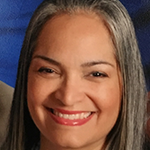
In 2014, I decided to pursue a doctorate degree in Human Services at Carlos Albizu University. I was attracted to this institution due to its Puerto Rican origins and the diversity of its faculty and student body. Its atmosphere is very personal and familiar, embracing students with a state of the arts facilities and attentive staff. At the time I was admitted, the Human Services Doctoral Program was in its first year, third cohort. The curriculum is designed to prepare students to assume executive positions and professional leadership. Currently, I am in the final stages of completing my dissertation entitled The Experiences of Latino/a Students with Autism Spectrum Disorder in Higher Education: A Phenomenological Study. I am grateful for the encouragement and support received from faculty and staff. I feel privileged in having become a spearhead for the program and mentor to my classmates.
Dissertation Completed: The Experiences Of Latino/A Students With High Functioning Autism Spectrum Disorder In Higher Education: a phenomenological study
-Mayra Lee Hernandez Ruiz, MSW, PhD in Human Services
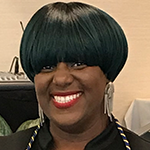
“My dissertation chair has been a guiding light for so many students especially me, to get one step closer towards their destiny. I am beyond thankful to have met her and my committee members for teaching me how to persevere through this process by giving me words of wisdom and support.”
Dissertation Completed: non-offending caregivers: The Association Of Caring For Sexually Abused Children, Parental Distress And Self-Efficacy
-Tawanda Spaulding, MFT, PhD in Human Services
“Niurka Leon, a student of the PhD in Human Services, has been officially promoted as Chair of the Languages Dept at MDC-Interamerican campus. She is truly an example of hard work and dedication. We are very proud to have Niurka as a student in our program.”
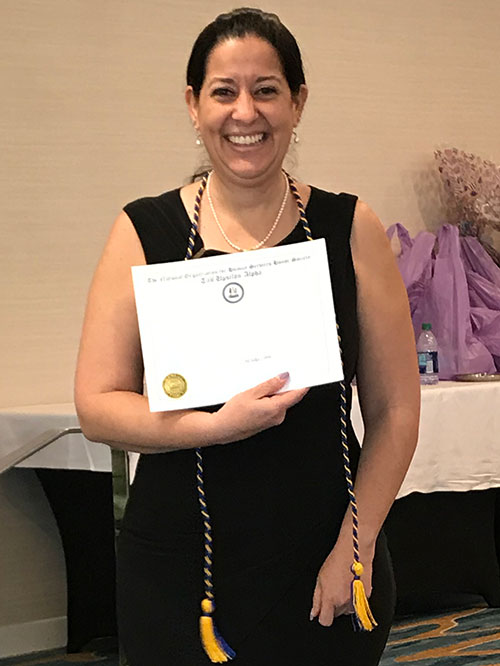
LEARN WITH THE BEST
COURSES

This course examines theories and advanced research findings that support effective negotiation skills. It will cover persuasive and influential strategies to achieve insights on how to develop plans that improve performance. Negotiation strategies cover effective decision-making and in-depth analysis of adversarial situations. Students will have opportunities to discern what information and tactic skills are needed to achieve effective negotiation outcomes. Prerequisite: HUMN704 Conflict Mediation.
Decreasing world violence and promoting a culture of peace requires examining people affected by violence at the individual, community, and societal level. This course will provide the theoretical background and methodological tools to study violence and its antidotes, such as resilience, and learn from groups or individuals who serve as role models and agents of peace and change. Students will connect with international networks that show real-life intergroup problems, to learn from them and propose strategies that may promote a culture of health and peace for their youth, families, and communities. Prerequisite: HUMN704 Conflict Mediation.
This course overviews current research and cultural factors in aging and examines associated sociological, psychological, and biological theories. The importance of successful aging will be emphasized, including cultural beliefs related to diet and exercise, individual and collaborative problem-solving, reasoning, decision making, intelligence, creativity, and wisdom. Changes in cognitive function, as in attention, perception, and memory, will be explored.
An important component of successful aging is to maintain social relationships, given their reciprocal relationship on development. This course will examine current research on the effect of proximal and distal social partners and their effect on the emotional, cognitive, and physical well-being of aging adults. Personality factors will be examined, to understand stability and change in social and psychological function. The course will consider morbidity and mortality, including healthcare, long-term care, and utilization of medical services in older adults.
In this course, the students will discuss the processes of human development with emphasis on the interrelatedness of all domains—physical, cognitive, emotional, and social. Classic and emerging theories will be discussed as well as their research applications. The interrelationship between the human being and the environment through the lifespan and the impact of multiculturalism and social policy issues will be analyzed.
In this course, the participants will explore the different leadership roles in nonprofit organizations, private and public organizations in the U.S., and foreign countries. This includes a variety of roles that go from program leaders to directors, board of directors, and community leaders. In this course, the participants will explore leadership theory as it applies to the different roles and responsibilities of leadership and the challenges that they experience in their interactions with the external environment. Key aspects such as board development, strategic planning, lobbying, marketing, fundraising, volunteer management, financial management, risk management, and compensation and benefits will be addressed. Prerequisite: HUMN703 Nonprofit Organizations Management.
This course will cover the roles and responsibilities of nonprofit personnel and volunteers, risk management, and the changing role of nonprofit organizations in American society. Students will examine the fundamental processes in operating nonprofit organizations, which include business management, public administration, accounting, human resources management, taxation, and business law as it applies to nonprofit organizations, as well as the legal requirements for establishing and operating nonprofit organizations and for securing tax-exempt status. Participants will compare nonprofit management styles and learn methods for creating internal systems that set standards of accountability.
Mediation is a process by which human beings engage in a dialogue facilitated by a mediator through which they explore ways of agreeing on a course of action based on their common interests, not on their positions. The role of the third party is to facilitate this process. Mediation is useful in every social setting in order to guarantee that people agree on the course of actions and solutions presented to human problems. New models of mediation have been developed recently and the field continues to develop and grow. At the beginning of the course, students will discuss different approaches to conflict resolution and their advantages and disadvantages and thereafter will focus on conflict mediation. Students will learn the principles, processes, and skills through the practice of mediation in simulated and real-life settings so as to become effective impartial third-party mediators.
In this course, the participants will acquire knowledge that will guide their decision-making processes in dealing with different constituencies in the helping professions. This includes challenges in dealing with employees, board of directors, clients, and interest groups like contractors and government representatives. The ethical principles, guides, and codes as well as legal issues relevant to the delivery of human services will be discussed. Students will study important cases in which ethical principles have been breached and discuss hypothetical examples with the purpose of increasing their awareness and readiness to deal with those situations appropriately.
This course explores activities related to human resources in the management process and the laws and regulations applicable to those processes. These include recruitment and placing processes, training and development, compensation and benefits, and work environment. Students in this course will be able to understand the importance of appropriate human resources in organizations and how to attract and keep the workforce they need through the wise use and management of the processes related to human beings in the workplace.
Crisis intervention is a process through which helping professionals assist individuals in dealing with situations that present a challenge to their psychological well-being. In this course, the students will study the theory and practical application of crisis intervention techniques. In dealing with people in crisis, they will use a six-step model—Defining the Problem, Ensuring Client Safety, Providing Support, Examining Alternatives, Making Plans, and Obtaining Commitment—and learn how to apply it in crisis situations. Prerequisite: HUMN701 Human Beings Through the Life Cycle.
This course serves as an introduction to the Human Services field, its history, theories, research, and practice. It will explore the evolution of the field in the provision of social and community services to diverse and underserved populations. Students will review and critically analyze the theoretical foundations of the field and will discuss research topics that will fit their career aspirations. Specific practice strategies, standards, and service deliveries will be explored.
This course examines innovative developments in creating and implementing human services policy in nonprofit organizations. It explores forces that mobilize current and future policy trends. Forming and executing policy requires consideration of multicultural contexts, as well as current and future organizational needs and strategies. The course will emphasize effective mechanisms of change in policy development and execution, based on previous research and successful human services policies. Specific examples and major cases of policy excellence will be used to illustrate different topics and maximize learning. Prerequisite: HUMN710 Human Services History, Theories, Research and Practice.
In this course, students will explore the research methods utilized in psychological research. Quantitative and qualitative methods will be reviewed as well as the use, advantages, and disadvantages of each approach. Topics include: scientific method, independent and dependent variables, ethics in research, validity, reliability, measurement reliability, qualitative and quantitative methodologies, and cross-sectional and longitudinal methodologies. Ethical considerations in research will be discussed.
This course will provide students with an overview of the methods, procedures, and techniques used in the conduct of empirical research on issues of interest in psychology. Topics will include: the scientific method, problem statement and research questions, hypotheses, study design, the nature and definition of constructs, the manipulation of variables, the concepts underlying and methods used for the assessment of the reliability and validity of measures, and the use of various ethical standards that govern the conduct of all research involving human participants. Prerequisite: RSHUM801 Research Methods.
This seminar provides an introduction to specific research designs, survey methodologies, and data sets. Students will identify an appropriate existing public-domain data set or a survey, generate informed and feasible research questions and hypotheses, design a practical and ethical research study, conduct basic descriptive and bivariate inferential statistics, and interpret results and present conclusions. Through methods that include a research proposal, data analysis using SPSS, and a final written report/oral presentation, students acquire applied analytical skills and make progress toward mastering the graduate-level learning objectives of critical thinking, scientific reasoning, self-directed learning, ability to conduct statistical analysis, effective oral and written communication, and dissemination of research findings.
In this course, students will explore different qualitative research methods, their theoretical perspectives, and their philosophical assumptions and implications for research development. The process of developing qualitative research will be analyzed, with applied examples in the human services field. The participants will be able to design qualitative research and discuss its uses, advantages, and limitations. Prerequisites: RSHUM801 Research Methods and RSHUM802 Advanced Research Methods.
In this course, students will study the purpose of mixed methods in research and its epistemological and methodological foundations. Participants will explore the major considerations in choosing methods, designing research, analyzing data, and writing a report. The four major types of mixed methods (triangulation, embedded, explanatory, and exploratory) and their uses, advantages, disadvantages, and limitations will be discussed. Prerequisite: RSHUM803 Qualitative Research.
In this course, students will be exposed to social and cultural variables—such as gender, race, ethnicity, immigration, and socioeconomic status—and how they affect the human condition. Students will learn how to become culturally sensitive researchers so as to gain an understanding of how different populations deal with life challenges within a participatory worldview that promotes transformative, emancipatory outcomes.
Prerequisite: RSHUM803 Qualitative Research.
This course will prepare doctoral students in grantsmanship, specifically knowledge regarding the process of seeking funding and grant evaluation. Students will complete all aspects of the grant proposal development process up to the submission stage. They will learn to manage and develop a grant budget, reporting mechanisms, and the overall program management of funding. Students will also obtain knowledge of the grantsmanship aspect of grant evaluation and the mechanisms utilized to critically evaluate grants. Prerequisite: RSHUM801 Research Methods.
This course is a prerequisite for Advanced Research Methods. The student will become familiar with various statistical techniques. Topics include: measures of central tendency, measures of variability, sampling distributions, inferences about the differences between means, proportions, etc., univariate analysis of variance, linear regression, and correlation. The course includes an introduction to and the use of the statistical software program SPSS as well as Excel. Prerequisite: RSHUM801 Research Methods.
This course introduces advanced statistical techniques and methods for data analysis. Topics include bivariate relationship, matrix algebra, review of multiple regression and correlation, part and partial correlation, canonical correlation, discriminant analysis and classification, cluster analysis, and factor analysis. Students will apply the techniques discussed to data drawn from actual research. Prerequisite: STHUM800 Statistics.
This course will introduce students to main quantitative concepts, methods, and computation techniques needed for the development, evaluation, and application of tests in the human services field. Actual tests and test items will be used for practical exercises. The construction and validation of tests in the human services field will be discussed. Statistical methodology, presentation of test theory as a discipline in the area of measurement, and individual test construction projects will be developed, in accordance with each student’s research interests. Prerequisites: STHUM800 Statistics and STHUM801 Advanced Statistics.
This process entails the preparation and completion of the dissertation concept paper under the supervision of a faculty committee, which will include: the topic of study, justification, preliminary literature review, proposed method, and proposed itinerary for the dissertation. Enrollment will require the approval of the faculty member that will supervise the dissertation. After the approval of the concept paper, the student will enroll in Dissertation. Prerequisite: RSHUM801 Research Methods.
In this course, the student will develop the dissertation. Enrollment will require the approval of the faculty member that will supervise the dissertation. The student will enroll in the amount of credits required to complete the proposed activities for each session as authorized by the dissertation supervisor. Prerequisites: Having passed the Comprehensive Exams and HUMN900 Dissertation Concept Paper.
Learning is the foundation of the adaptive capacities of the human being. This course will focus on the emerging field of neuroeducation. The mechanisms of learning will be discussed from a theoretical and practical neurodevelopmental framework. Students will be introduced to the learning style perspectives. In addition, brain-based factors and other conditions will be analyzed within the context of this new approach to academic learning and education.
Neuroscience provides the foundation for the understanding of human behavior including covert cognitive and non-cognitive psychological processes. This course will present the nervous system from the embryonic states of development, through infancy, childhood, and adolescence. Structural, physiological and adaptive components of the nervous systems will be addressed using lectures additional to underlining brain models and digital technology.
This course will provide the traditional pediatric neurological conditions including epilepsy, traumatic brain injury, Tourette’s syndrome, corpus callosal agenesis, genetic disorders, and neuro-oncology will be covered. Also, learning conditions as ADHD/ADD and other social cognitive disorders and Specific Learning Disorders.
Let’s chat
about your goals and how we can help you reach them.








